Coming out of the Great Recession's years of soft freight and slow economic growth, owner-operator Adam Johnson and fellow personnel at his family's K&D Transport small fleet had a stroke of inspiration. It had been a long time coming.
Johnson, a fourth-generation truck operator increasingly involved in ownership and management of the third-generation family business, was with his family essentially staring down the barrel of closing their doors in 2012. Over the course of the big economic contraction in prior years, former $6-$7-per-mile oversize contracts with 48-foot flatbeds turned to a paltry $2.50 a mile in many instances. The 2012 year "was probably the worst year we ever had," Johnson said. And as the year began the company just "didn’t know how bad it was going to get."
The stroke of inspiration: "I sold all my trailers," he said, which were 48-foot flats and step decks, and "ordered brand-new 53-foot Wilson flats." As shown in the picture at the top, with the company's stretch Kenworths, "we came up with the idea that if we put a steel coil in the center of the trailer," essentially a full load of palletized foam insulation could fit around the coil and still remain under weight limits. Johnson, with two owner-operators leased to the company, implemented the idea, and that outside-the-box thinking allowed the company to thrive when so many other fleets were struggling just to get by.
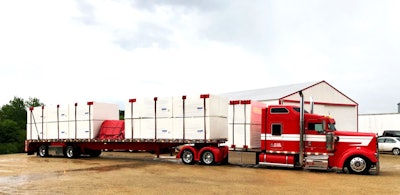 An example -- behind Johnson's first Kenworth, a 2003 W900, powered by a 1999 Cummins Signature 600, 13 speed transmission, 3.55 rears, and with a 335-inch wheelbase.
An example -- behind Johnson's first Kenworth, a 2003 W900, powered by a 1999 Cummins Signature 600, 13 speed transmission, 3.55 rears, and with a 335-inch wheelbase.
Since then, Johnson's assumed management of operations at K&D as his father has stepped back from the day-to-day. Over four years, K&D Transport doubled in size to 12 trucks as of the end of 2022, adding more operators this year even as freight volumes have softened. It's a testament to creative thinking that K&D is among five semi-finalists in the 11-30-truck division of Overdrive's Small Fleet Championship.
 This is one of 10 Small Fleet Champ semi-finalist profiles that will run throughout this month. (Access all of the published profiles via this link.) Two finalists in each category (3-10 trucks, 11-30 trucks) will be announced in October.
This is one of 10 Small Fleet Champ semi-finalist profiles that will run throughout this month. (Access all of the published profiles via this link.) Two finalists in each category (3-10 trucks, 11-30 trucks) will be announced in October.
"We hauled lumber down to Chicago," Johnson said, loading the coils and insulation there for the trip back to Minnesota.
K&D-leased owners and company drivers don't run quite the same freight today. With growth since that time period, even as they were undercut by other carriers on some of those loads, "we’re not going to haul for nothing even though we can put two loads together," Johnson said.
A primary customer, Jeff Wold described K&D as integral to the operation he heads up in Menomonie, Wisconsin, an outpost of structural steel distributor Brown-Strauss. Wold lauded Johnson and company as "the perfect example of doing it right, and doing it smart. They're awesome to work with. If we have a problem and we need something run -- boom, they’re here. Good to go. They have phenomenal equipment, and great drivers. Friendly, pleasant, knowledgeable. You can really depend on them and trust them."
[Related: LB Trucking: A right-sized family affair]
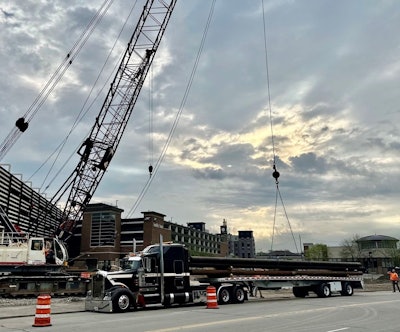 A K&D tractor and 53-foot flatbed trailer on-site for unload.
A K&D tractor and 53-foot flatbed trailer on-site for unload.
Wold's loads are known for next-day delivery -- as long as sales gets their order by 4 p.m., K&D's there "by 5:30 in the morning to get to where they need to go," Wold said, usually within a 300-mile radius out from Menomonie, though Nebraska and Kansas destinations take some farther afield. And the company's beginning to ship product into Ohio as well. Eventually, Wold noted, "we’re going to be going to Michigan," both the Upper Peninsula and lower Michigan as well, for greater distances.
K&D is well-poised to capitalize on expanded business there as the needs arise. Each of the last few years has seen steady improvement in revenues after those difficult prior years, even as they've added equipment to get them up to a total 14 trucks, including owner-operators leased on, and almost twice as many trailers. Johnson's got three more trucks sitting in the yard awaiting rebuild to add to that total. He also operates an associated Johnson Hill Customs business that does anything from big custom projects to basic mechanical work. "I would like to be over 20 total" trucks "by next summer," he added.
Then, he's hopeful to get into the brokerage side of things and make friends with more "one-horse guys with one or two trucks," he said. "I'd love to grow along with those guys." Like the National Association of Small Trucking Companies does with their fuel card, he said (yes, K&D is a member) -- aggregate the buying power of the group toward the success of each individual business.
"If we can stay true to where we are now," with a "quality over quantity" sort of approach to customers, he said, "we can translate that to brokerage over the next five years."
'Nothing to do with trucking' through 'tough love' to ultimate mastery
Brown-Strauss's Wold knew K&D and the Johnson family from long before his tenure at the steel distributor, which began in recent years. Back when he drove for a Menard's distribution center, Wold was familiar with Dwight Johnson, Adam's father. K&D in the early part of this century was contracted on loads for Menard's to the Twin Cities. Yet the company's history goes way, way back. In 1946, Adam Johnson's grandfather and former World War II POW -- "in three different death marches before he was liberated," Johnson said -- started out with a 1946 Brockway tractor he bought without a seat in it.
"Drove it sitting on a milk crate" for the first trips, Johnson said. "The Chicago to Minneapolis turn at that time took a week," a West Coast run from Spring Valley and back more than twice that.
The modern era for the family business then began as so many trucking stories do, around the time of deregulation in 1980. Johnson's dad, Dwight, was by now involved in the family business, and the company hauled product for Brut deodorant/Faberge as a primary customer. After Adam's grandfather had his second heart attack, Dwight Johnson dropped out his second semester of college to keep the contract going. The plant they serviced for Brut closed in 1980, then, and Dwight and his wife, Karen, incorporated as K&D Transport, with their own authority, becoming "one of the biggest grain haulers in our area" up through the late 1990s. By that time, they'd grown to 17-18 trucks.
[Related: From wildcatting to deregulation: A 'Brief history of trucking in America']
"They were plateauing for retirement," then, Adam Johnson said, and sold the grain business and many of the trailers. By the time Johnson graduated high school in 2003, in his heart of hearts he really "wanted nothing to do with trucking," as he told his own story. He went on tour exercising another passion, racing snowmobiles professionally and living out of a duffel bag. From that vantage, the proverbial "white picket fence" started to look like something worth going for, he figured.
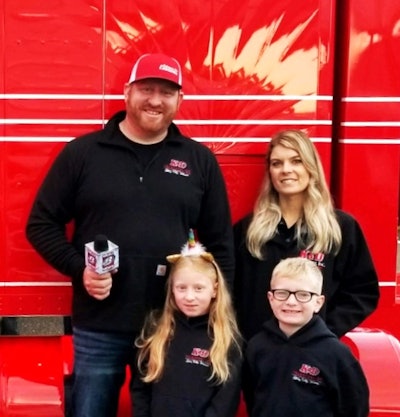 Adam Johnson with his wife and children -- his girl will be 8 this year, son 7.
Adam Johnson with his wife and children -- his girl will be 8 this year, son 7.
"He told me he was selling my truck," Johnson said, and "I needed to buy a truck to stay in the business." A pattern was set for the future growth of the fleet when he borrowed $6,500 and picked up a 1999 International 9300 from a junkyard in Vermont. It had just a single drive axle, to which he added a tag, all of it powered by a Cummins N14 with 3.42 rears. He ran cross-country hauling over-length power poles and more.
After the entrenchment of rough condition through the Great Recession, in 2010 he bought his first Kenworth, the 2003 W900 that's still part of the fleet and now with 3 million miles on it -- another driver pilots it today.
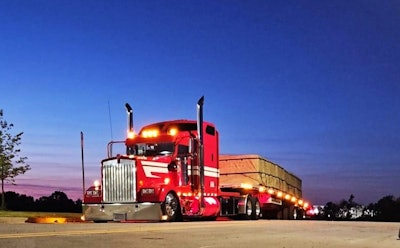 That truck, and long work on it, would eventuallly inspire the establishment of the Johnson Hill Customs shop/support business. "We do mechanical work, everything in-house," Johnson said. Anything from "engine replacements and overhauls to frame work and frame stretches," air ride kits, full paint jobs. The business has been fully operational now and public-facing "for about two years."
That truck, and long work on it, would eventuallly inspire the establishment of the Johnson Hill Customs shop/support business. "We do mechanical work, everything in-house," Johnson said. Anything from "engine replacements and overhauls to frame work and frame stretches," air ride kits, full paint jobs. The business has been fully operational now and public-facing "for about two years."
K&D Transport by that time had just a single company truck, maybe two, Johnson said, with eight or nine owner-operators leased on, as he'd increasingly been drawn to flatbed and oversize work. It was a really rough time, as noted, two years into the recession. As rates collapsed, they had to walk away from their power pole contract, Johnson said, which had at that point comprised as much as 80 percent of their business.
What followed was an increasing diversification, led by the stroke of inspiration detailed at the top, and a never-ending close focus on maintenance, more driver-friendly freight and solidifying benefits, all of which transformed K&D to what it is today.
[Related: Poised for longevity, growth: Small Fleet Champ Silver Creek Transportation]
A decade toward stability, growth
The company today owns a step deck and a van and about 22 flatbeds, six conestoga set-ups among them -- "all roll-tarp," said Johnson, a few from the Quick Draw company. It's up to 14 trucks all told, several owner-operated under lease agreements with the company. It's been within the last five years that Johnson has really begun to push the envelope on solidifying the business with growth and operational stability, he said. "I really started buying trucks," in a lot of cases sticking to the playbook he used with his first -- taking old equipment and making it new, including with some models as new as 2012.
While "a lot of people are going to aerodynamics," he said, and "I’m all about fuel mileage, too," Johnson's fleet for the most part features a strong old-school vibe, with a lot of Kenworth W9s. "I want people to be proud of working for K&D with the W9s." While some of his owner-operators use ELDs for hours of service compliance, a lot of the company fleet runs gliders. His personal truck today is a totally rebuilt 1994 model KW, They've got a 1996, 1997s that have been completely rebuilt, too. The 2012s he owns "look like they’re 2020s and 2021s" -- fully rebuilt themselves to be "as new as possible as we can. All have aftermarket front air ride" to make those W9s ride "like a minivan," he joked.
In all seriousness, though, the Johnson Hill shop sells those air ride kits -- "what better way to say the product is awesome" than to use it yourself, he said.
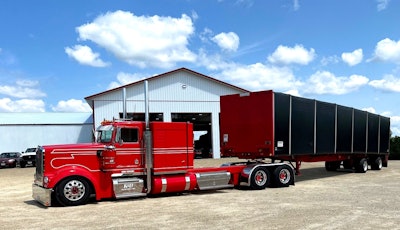 Adam Johnson's current personal truck, a 1994 Kenworth W900L powered by a Cummins Signature 600 with a 13 speed transmission, 3.36 rears. The truck is stretched to 310 inches of wheelbase.
Adam Johnson's current personal truck, a 1994 Kenworth W900L powered by a Cummins Signature 600 with a 13 speed transmission, 3.36 rears. The truck is stretched to 310 inches of wheelbase.
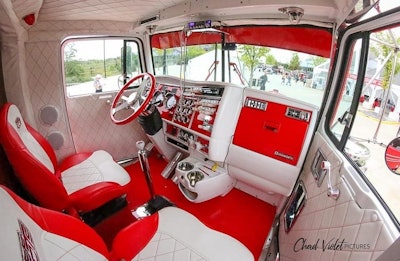 The interior is fully custom, and Johnson and company outfitted the rig with a new Mercury sleeper behind those seats.
The interior is fully custom, and Johnson and company outfitted the rig with a new Mercury sleeper behind those seats.
Eschewing the larger 86-inch studio sleepers featured on many OTR Kenworths helps maximize legal payload for their platform freight. With frame stretches on many of the trucks out to 300 inches and more, "we're already pushing it on weight" a lot of the time, Johnson said.
Drivers carry 30 20-foot straps onboard, enough for any situation they might encounter, plus a variety of other securement equipment for coils and other pieces. Long sleeves, always, safety glasses or sunglasses, 90-inch-wide platforms behind the cab to "step from the platform right up to the trailer," Johnson said.
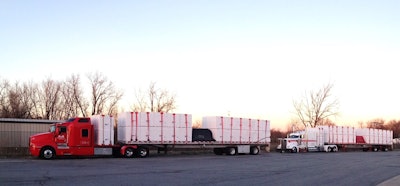 Useful for those coil/insulation consolidated loads, too, that sat at the crossroads to where K&D is today.
Useful for those coil/insulation consolidated loads, too, that sat at the crossroads to where K&D is today.
"The more efficient you are, the safer you are, too. Less steps, less movement," means fewer accidents, Johnson said. "I’ve stepped off a trailer a handful of years ago." It's not a pretty outcome, most of the time. "We implemented hardhats with chin straps if you’re around the trailer."
As the pictures you've seen so far no doubt attest, "they use a lot of really nice Kenworths driving down here," said Jesse Eckert, owner of a sawmill that bears his name in Medford, Wisconsin. "They're great people, easy to work with." Eckert noted K&D had been hauling up to three loads a week out of his mill destined for a pallet maker in Indiana and elsewhere. That's how the relationship started, four or five years ago now.
"We were trying to figure out trucking" that far afield, Eckert said, and the pallet company gave him Adam Johnson's number. It was Adam himself that showed up for that first load.
"I didn’t know he was the owner" the first few times he showed up at Eckert's place, he said, though the two had of course arranged for the loads on the phone. "I was just assuming they send somebody to help out here. He said, 'I’m the owner.' I guess I didn’t know that."
He remains impressed by the service, and particularly the equipment. "I live down a gravel road," he said. "I hate to see them have to come down that road."
Said Johnson of the three-four-mile trip down the path to Eckert's place: "He’s just such a good guy I’d drive through a mudhole to get to him."
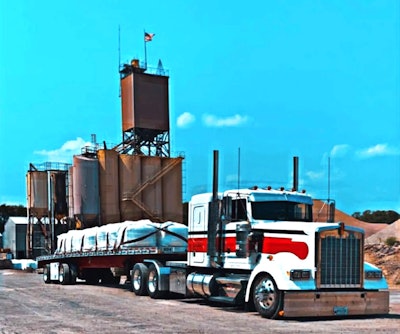 Trucks are serviced conservatively, every 10K-12K miles, Johnson said, and greased weekly. "I'm super-particular on that," running a lot of older equipment "we keep rebuilding." An adjusting fuel surcharge with customers helped shield them from recent-history hikes, likewise NASTC's fuel program. About half of the company drivers are on the company health plan, 50% of which is paid by K&D after starting up two years ago. It's offered to the owner-operators, too, including dental and vision. Coming up in January, employees will get a week of paid vacation. "We're trying to figure out how to integrate retirement funds in a year or two," with matching contributions at a level as yet undetermined. All in all, he hopes working at K&D dovetails with the “what you get out of it depends on what you put into it" maxim. He's always focused on how he might make it "more than just a job," he added, "more than just punching in and out."
Trucks are serviced conservatively, every 10K-12K miles, Johnson said, and greased weekly. "I'm super-particular on that," running a lot of older equipment "we keep rebuilding." An adjusting fuel surcharge with customers helped shield them from recent-history hikes, likewise NASTC's fuel program. About half of the company drivers are on the company health plan, 50% of which is paid by K&D after starting up two years ago. It's offered to the owner-operators, too, including dental and vision. Coming up in January, employees will get a week of paid vacation. "We're trying to figure out how to integrate retirement funds in a year or two," with matching contributions at a level as yet undetermined. All in all, he hopes working at K&D dovetails with the “what you get out of it depends on what you put into it" maxim. He's always focused on how he might make it "more than just a job," he added, "more than just punching in and out."
That sense of dedication extends to company employees and owners leased on, all of whom are paid a percentage of the load. Company operators start at 25% of gross, then after six months a 3% bonus (worth anywhere from $80-$350 a week, depending on gross) gets tied to a variety of conditions, including keeping the truck washed. The company Blue Beacon account really gets a workout, Johnson said. "I tell our guys when they’re hired, 'I want the truck washed at least once a week on the road -- two or three times is great on the road.'" Get clean at the shop for the weekend in the summer. In winter, spray the salt off at least before you park them in.
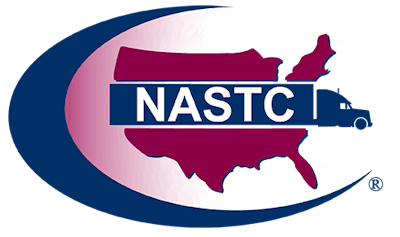 The National Association of Small Trucking Companies is sponsoring this year's Small Fleet Championship program. Finalists receive a year's worth of membership in the association, with access to a myriad of benefits from NASTC's well-known fuel program to drug and alcohol testing services and much more. All will be recognized at the association's annual conference, where the winner will be announced in November. Find more about the association via their website.
The National Association of Small Trucking Companies is sponsoring this year's Small Fleet Championship program. Finalists receive a year's worth of membership in the association, with access to a myriad of benefits from NASTC's well-known fuel program to drug and alcohol testing services and much more. All will be recognized at the association's annual conference, where the winner will be announced in November. Find more about the association via their website.
"When I was brought up, if you’re not working seven days a week, something's wrong," he said -- it's a mindset built from a farming community background. "Now, folks want to work less -- what can we do to give people" that opportunity?
"I get it, too," he added. "The biggest push for me growing the business was to be home" for his kids, who will be 8 and 7 this years. "The more I can make and set my generation up ... Every generation should be better than the next. I want to be able to have enough there to help them with their dreams."
[Related: Wallace & Sons Transport: Specialized bulk loads, confidence and competence]
from Overdrive https://ift.tt/3qb80OS



Sourced by Quik DMV - CADMV fleet registration services. Renew your registration online in only 10 minutes. No DMV visits, no lines, no phone mazes, and no appointments needed. Visit Quik, Click, Pay & Print your registration from home or any local print shop.





0 comments:
Post a Comment